māmawohkamātowin
Community Connections – These are the ways we work with others
Protection of Mother Earth
We are advocates for Mother Earth and work with organizations and groups with this focus.
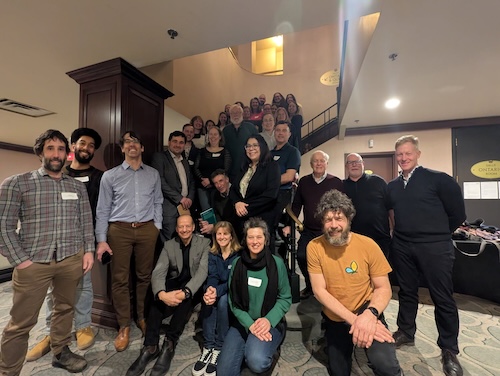
The kihci-okāwīmāw askiy Knowledge Centre's participated in a workshop about Key Bio Diversity Areas (KBA), the focus was on Enhancing action for KBA conservation and stewardship. In February 2025, a two-day gathering was held in Ottawa. Discussions included what the centered around developing priority actions as a basis for the next phase of work on KBAs.
To learn more, visit the Canada Key Biodiversity Areas website.
Buffalo Rematriation
The ways in which we partner with others who are supporting buffalo rematriation.
The representatives of the kihci-okāwīmāw askiy Knowledge Centre attended the Wild Buffalo Summit hosted by the Alberta Wilderness Association. The goal was to discuss the differences between the rematriation of wild verses domestic buffalo in Canada. The group included Indigenous and non-Indigenous people representing many nations and organizations including:
- Nature Conservancy of Canada
- Parks Canada
- Alberta Wilderness Association
- Canadian Bison Association
- University of Alberta
- University of Saskatchewan
- University of Manitoba
- International Buffalo Relations Institute
The two-day event began with guidance and a prayer from Elder Charlie Fox, Blood Tribe, AB and a reminder from co-chairs Dr. Tasha Hubbard and Candice Pete-Cardoso about the importance of “Nothing About Us, Without Us.” Eight Indigenous language groups were represented at the gathering. The importance of the buffalo from Indigenous perspectives was conveyed by the attendees representing the Blood Tribe, Dakota, Nakota and Cree peoples.
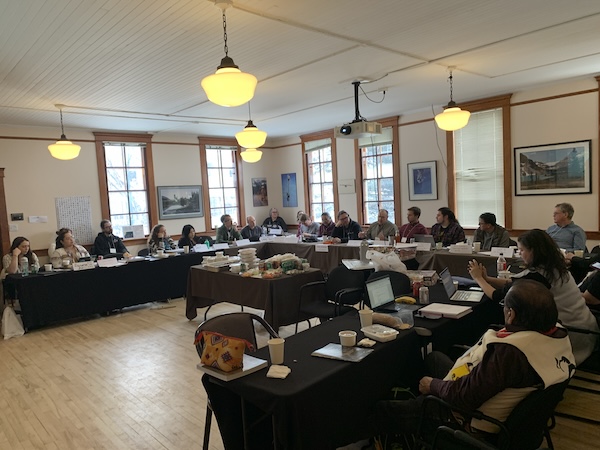
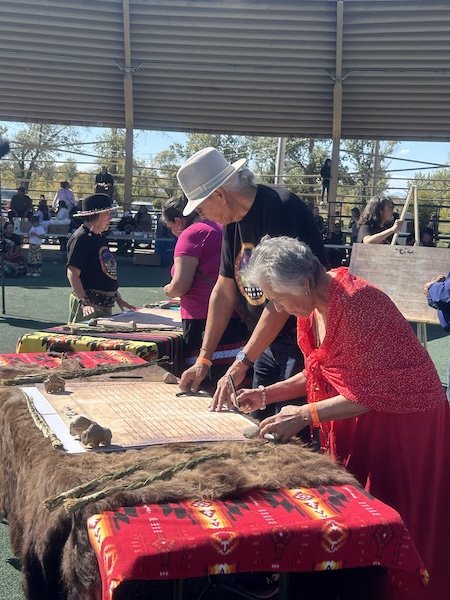
The International Buffalo Relations Institute, led by Dr. Leroy Littlebear and Dr. Tasha Hubbard, have made significant strides in fostering relationships and understanding around the Buffalo Treaty. One of their notable initiatives is the Buffalo Treaty Research Network (BTRN), which welcomed new members, including kihci-okāwīmāw askiy Knowledge Centre academic director Dr. Melissa Arcand and director Candice Pete-Cardoso in 2024. The goal of the Buffalo Treaty Research Network is to build relationships with one another and learn more about the Buffalo, the Buffalo Treaty and how the network can support buffalo nations and signatories.
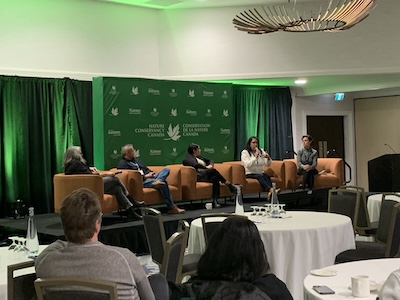
Filmmaker, Dr. Tasha Hubbard is a friend and partner of the kihci-okāwīmāw askiy Knowledge Centre. This relationship has led to opportunities to participate in various panel discussions following screenings of the Nature of Things (45-minute version) of the film. The full length film is available on APTN Lumi.
Spreading awareness about buffalo rematriation by sharing the film and participating in panel discussions are an opportunity for the centre to honour our commitment to the Buffalo Treaty.
Grasslands Conservation
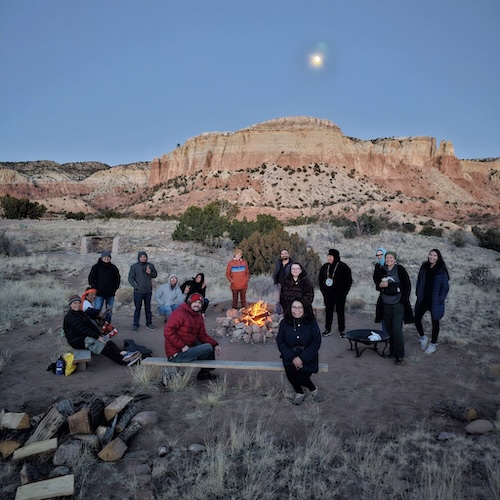
The Indigenous Kinship Circle (IKC) is a community of practice for Indigenous people and allies, focusing on grassland conservation on Turtle Island. The inaugural gathering was held in New Mexico, United States on the traditional homelands of the Pueblo, Apache, and Navajo Nations on March 11-14, 2025. The centre's Director and Special Projects Officer were invited to join the IKC as committee members and were sponsored to attend the gathering. It was made possible thanks to funding support from Canadian Wildlife Services and with the administrative support of the Bird Conservancy of the Rockies.
Twenty-eight participants representing twenty-two nations engaged in rich conversations about the following: the vision for the IKC; reconnecting between generations, across borders, and with the natural world; education and awareness about grasslands, food sovereignty, community-led approaches; and Indigenous perspectives in conservation, and Environmental Justice through bringing awareness to Indigenous rights and legal concepts, duty to consult, treaties, etc.
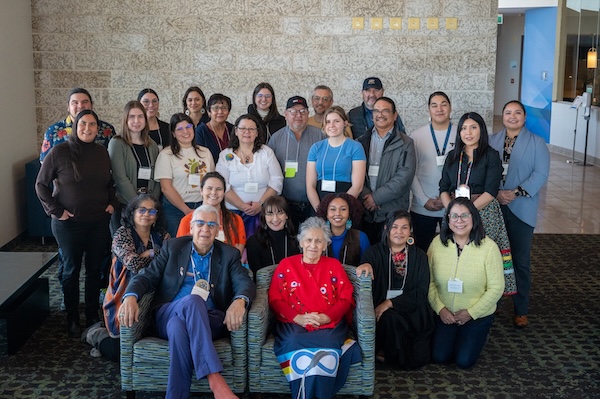
The kihci-okāwīmāw askiy Knowledge Centre led a project aimed at respecting and uplifting the sovereignty, knowledge, and languages of Indigenous nations, with the goal of driving systemic change in grasslands conservation efforts. This initiative aligned with the centre's vision statement, "kihci-okāwīmāw askiy pimātisiwin ka-āsōnamākēt, poko kwayask ka-manācihāyahk. Great Mother Earth gives us life; in return, we have the responsibility to respect her." which emphasizes the importance of Indigenous-led conservation.
The centre partnered with the Canadian Wildlife Federation (CWF) which aims to develop a Canada-wide communications campaign within the next two years, focusing on the beauty, cultural significance, and ecological value of grasslands. By contracting the kihci-okāwīmāw askiy Knowledge Centre, the CWF sought to ensure that Indigenous perspectives were central to this campaign. A key component of this effort was a gathering of Indigenous peoples to provide advice and guidance on effective conservation messaging. The event was held in January 2025.
In Community, For Community
The ways in which we are honouring "Nothing about us without us".
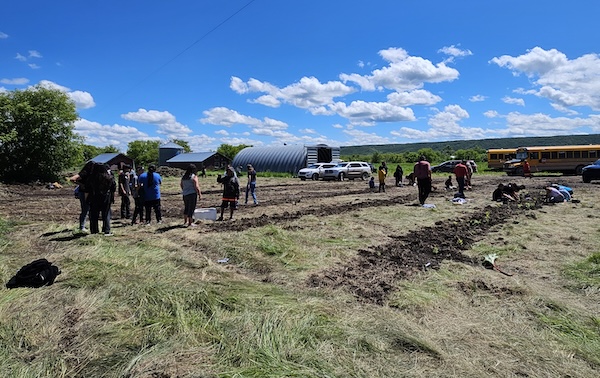
The kihci-okāwīmāw askiy Knowledge Centre worked with and supported Dr. Nicholas Tyack, assistant professor, Van Vliet Professorship, College of Agriculture and Bioresources (AgBio) starting in 2023. The goal of the centre was to support the relationship building between Dr. Tyack and rights holder, Kahkewistahaw First Nation. In 2023, the nation toured the phytotron and visited the AgBio orchards as part of their visit to USask. In 2024, Dr. Tyack was successful in securing resources from a SSHRC Exchange proposal which supported the planting of an orchard in June of 2024. The orchard was planted on the nation’s treaty land entitlement lands. The orchard was planted by Kahkewistahaw First Nation elementary students, the land management office staff and leadership from the nation. There was federal government staff that attended. They provided an overview of the plants being planted in the orchard. The centre was grateful to volunteer and to attend the one-day event planned by Dr. Tyack and the Kahkewistahaw First Nation team.
The kihci-okāwīmāw askiy Knowledge Centre’s askiy Mentorship Team supports instructors who teach project- and community-focused courses by connecting them to Indigenous communities, emphasizing the importance of being “in community, for community”.
In the 2024-2025 academic year, the Renewable Resource Management 421 class was taught by Professor Bryan Mood and had eight students who worked with two different partners. Five students worked with Little Pine First Nation and the remaining three worked with Wanuskewin Heritage Park.
Little Pine First Nation (LPFN)
- The 2024-2025 academic year was the second year of a 10-year project between the Little Pine First Nation and RRM 421 – College of Agriculture and Bioresources. In the fall, the students travelled to the nation and met the chief and council. The project defined by the community is to plant a garden and orchard in suitable locations.
- During the initial visit to the community, the students took soil samples and found suitable locations to grow potatoes. In term two they produced a report titled “Food Sovereignty Planning and Mapping” and presented it to the Chief and Council members in April 2025. During their visit, the students connected with the high school students alongside staff from the Soil and Agro-Ecosystem (SAGE) Project. The SAGE team brought soil cores to teach students how to classify soils as well as dried plant samples of native plants of that area.
Wanuskewin Heritage Park
- The students worked with staff member and soil scientist from Wanuskewin Heritage Park. The students identified five invasive plant species and spent time during the academic year locating those plants and considered mitigation options and associated risks. In March 2025, the students presented a report to the Wanuskewin Heritage Park Authority outlining their recommendations.
- The report included maps with GIS data about the locations of those five invasive plants species within the park, informational fact sheets about each plant and resources for additional support in the future, including a list of funding opportunities to continue the work, as well as the names of three professors and course names for potential collaboration. They also provided a list of mitigation options and the risks associated with each option.
Relationship Building
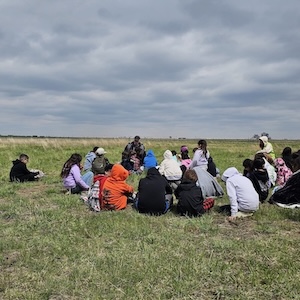
On May 22, 2025, the kihci-okāwīmāw askiy Knowledge Centre was invited by Associate Vice-President, Research, Dawn Wallin and the Indian Teacher Education Program (ITEP) to visit the bison stone paddock at the Livestock and Forage Centre of Excellence (LFCE). The event was organized for Grade 3 students from two schools as part of an initiative called Wahkohtowin: Decolonizing Teacher Education. Elder Roland Duquette, LFCE Director Scott Wright, and representatives from Saskatchewan Search and Rescue, led the students and guests in activities. One of the highlights for us was watching the children learn some nēhiyawēwin (Cree) words out on the land.
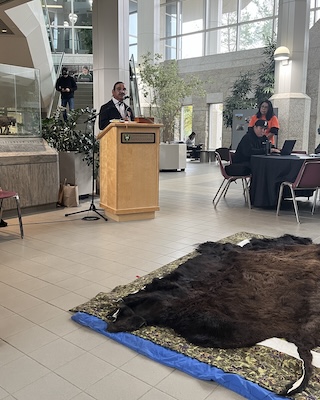
Two members of the kihci-okāwīmāw askiy Knowledge Centre's steering committee include the Executive Director and Executive Assistant of Saskatchewan Aboriginal Land Technicians (SALT). Our partnership includes hosting workshops together and inviting SALT to the inaugural gathering of the Wild Buffalo Summit in February 2025.

